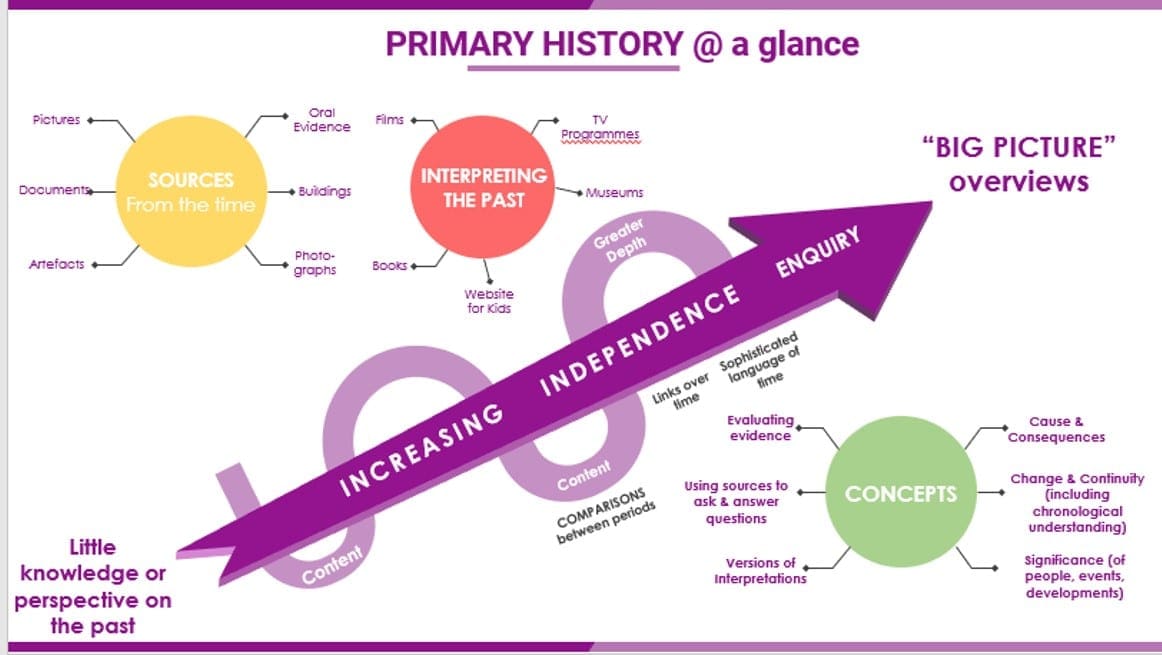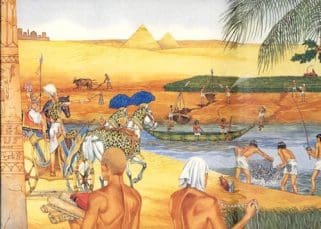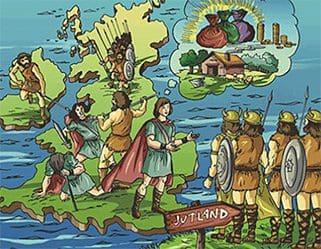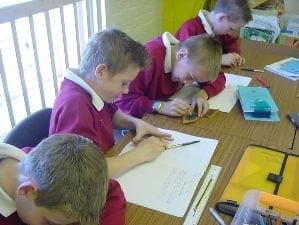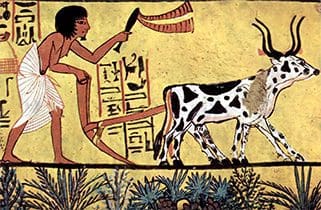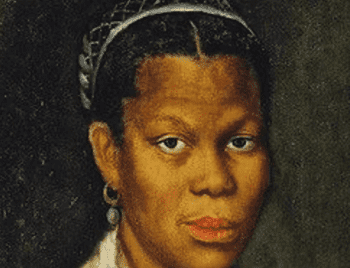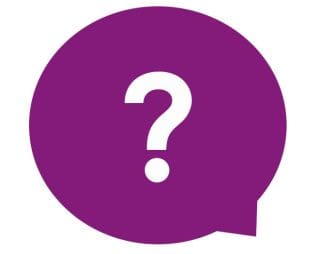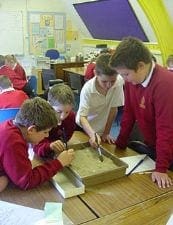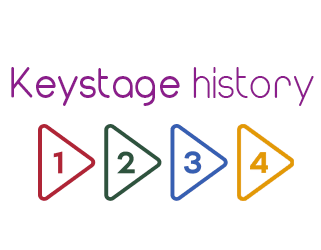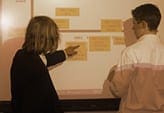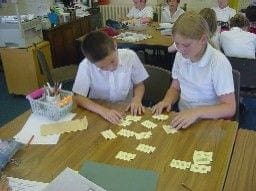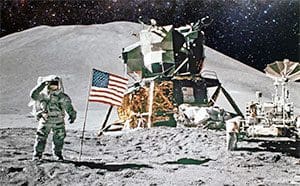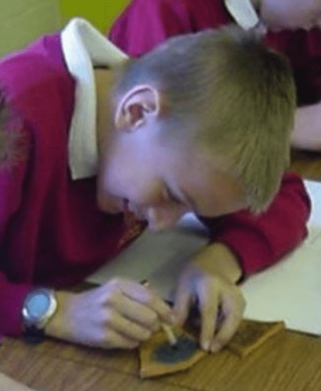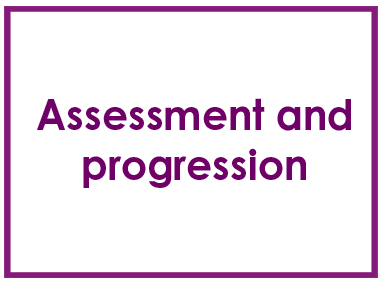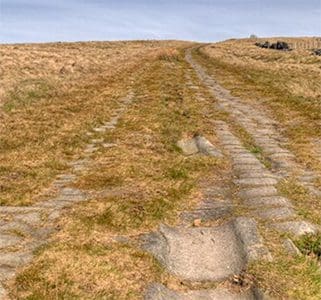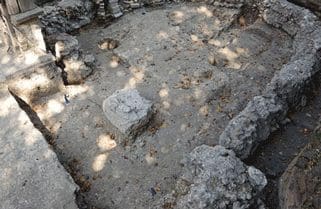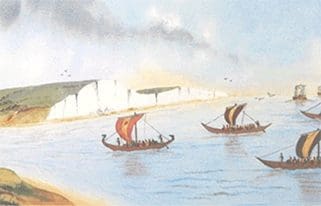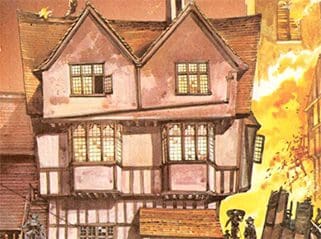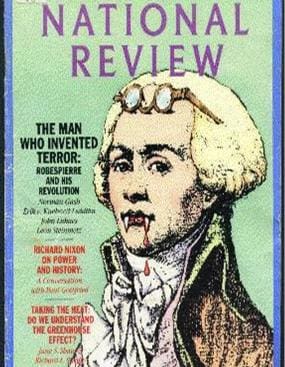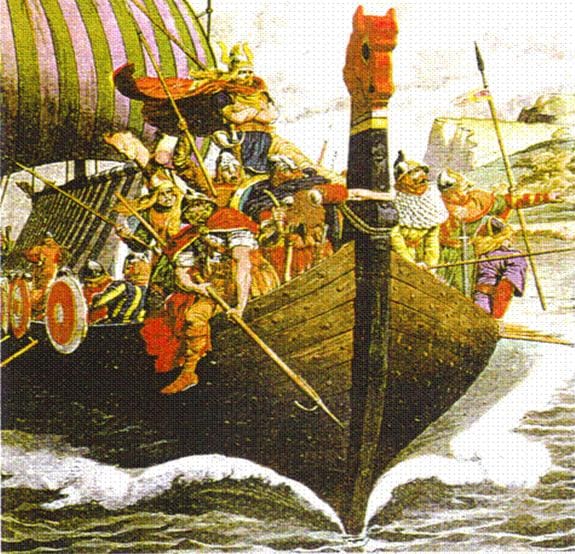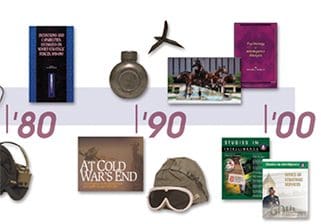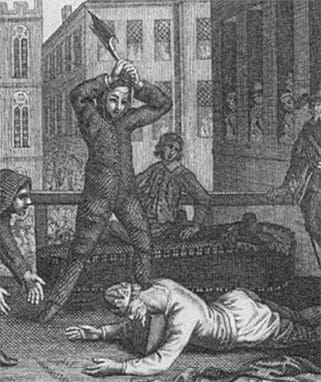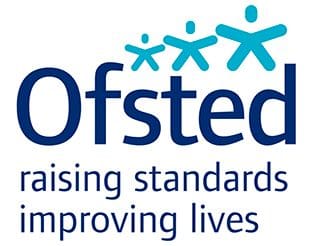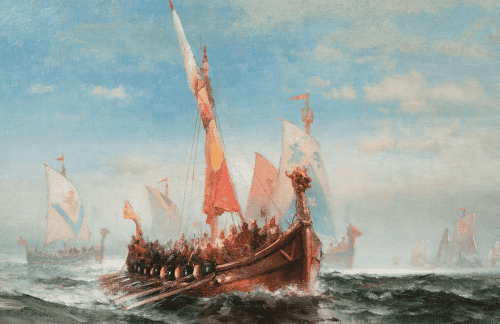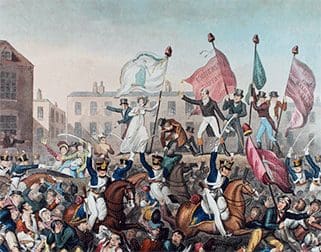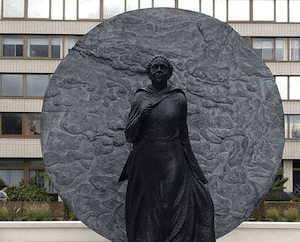History teaching tips
Take a new look at assessment in history in your school.
Now is the perfect time to get your assessment system for history in better shape. If colleagues know the criteria…
Read MoreWhat can you do at KS3 to make your history curriculum more representative?
In a recent article for the Historical Association ( HA news- Autumn 2020) Jake Subryan Richards offers his advice: ”…
Read MoreWhat is primary history? Have a look at this ‘at a glance’ diagram which encapsulates the essence of the subject
The accompanying diagram attempts to display all the main elements of developing your pupils’ historical understanding, in one place. You’ll…
Read MoreLinking your early civilizations at KS2
There is a real and present danger in KS2 of failing to make links between topics. If we are not…
Read MoreThinking about evidence at KS2. How do we know what happened in Saxons times?
Where does our knowledge of the Anglo-Saxons come from? It is important that we ask the recurring question “How do…
Read MoreThe importance of getting your key questions right in your KS2 history planning
Scanning through a number of KS2 history websites recently, I realised just how narrow a view of history was being…
Read MoreHow much do you need to talk about chronology when studying Ancient Egypt?
This is a question that has concerned many primary teachers for a long time. I have sat in the back…
Read MoreImproving diversity in your KS2 history curriculum
Amid the current state of heightened racial tension across Britain and the USA, I thought it might be a good…
Read MoreGetting your enquiry questions right for your history topics at KS1
Getting your enquiry questions right at KS1 On the Historical Association website is a scheme of work on George Stephenson…
Read MoreThinking historically: ‘learning to’..as well as ‘learning about’
While so many of you are locked down, it seems a good time to remind you of the key features…
Read MoreImproving history in your primary school: a short cameo of a success story
So what does effective leadership of primary history look like? A case study When Lara took over as history subject…
Read MoreGCSE history: Answering the question set , not the one they would prefer to answer.
Many of you teaching GCSE will be familiar with the issue. Your students answer the question they think the examiner…
Read MoreKey ideas in primary history
When we are teaching 11 subjects it is often difficult to catch the essence of each. If we’re not careful…
Read MoreGreat learning activity: Prove it! See examples for Scott of the Antarctic, Man on the Moon, Tudor theatre, Grace Darling, Louis Braille
One of the most effective learning activities which you will find in a small number of the outstanding lessons is…
Read MoreCreating your own timelines at KS2: one school’s recent find.
Charley Chanter of HertfordHeath primary school has just brought this Timeline making package to my attention He wrote:.I have been…
Read MoreAt last a way forward with KS2 assessment for history that will work for my school
Even though we will have had the National Curriculum for history ( albeit in different guises) for nearly 30 years,…
Read MoreWe learn by being excited not by being told; abiding principle of Keystage history
I get a lot of enquiries about Keystage history, largely from teachers who want to know what to expect from…
Read MoreDid you know there were over 1000 Roman sites in England and Wales?
The numerous discoveries of Roman finds, often by private metal detectors, have revealed more than 1,000 Roman sites in England…
Read MoreTeaching the Iron Age at KS2: are you teaching the right things?
In a recent article in Primary History by Karen Doull of the Historical Association adumbrated a list of the ‘Ten…
Read More5 things primary history subject leaders should be doing next term
It obviously makes no sense to ordain a calendar of must-do tasks that all primary history leaders should be following….
Read MoreKS2 update on Saxon conversion to Christianity-the first stone churches
Excavations in Kent have just revealed that there were STONE Saxon churches being built in England as early as AD…
Read MoreMaking the Saxons relevant for BAME pupils
In the corridors of academia there has been much debate about the relevance of the british university and school history…
Read MoreMaking links in history at KS3: 5 simple questions to ask your pupils
5 quick and simple questions to help pupils make links in history at KS3 When else have we come across…
Read MoreSwapping a Great Fire for a volcanic eruption? Looking for a new famous Event at KS1?
In a recent article in the Historical association’s Primary History Sue Townsend makes a very strong case for introducing the…
Read MoreHow many of these 50 KS2 history concepts do your pupils understand?
How many of these KS2 history concepts do your pupils understand? Afterlife Army Blitz Border Christianity City Civil war Civilization…
Read MoreWhat does greater depth look like in history at KS2 and 3?
What does greater depth mean in history? So, we all know it doesn’t just mean knowing more stuff. We also…
Read MoreWriting frames in KS2 and 3 history: Uncomfortable Procrustean bed or essential tool for explanatory writing.
For years history teachers have been using writing frames. Some are better than others. Some are downright unhelpful . It…
Read MoreHow to implement successful curriculum change in history: using the EAST model
Most schools will have come up with a new curriculum for history at a time when the statutory changes took…
Read MoreUsing small stories to reveal big pictures in our history teaching: a practical example
Small stories and big pictures As history teachers, we love telling stories. We do this to motivate pupils as we…
Read MoreImproving your questioning in history to improve learning
We all know that less than 10% of questions we traditionally ask in British classrooms actually caused new learning. Most…
Read MoreDon’t bark up the wrong tree with progression-its all about the history curriculum not content-free skills
There has been a lot of confusing talk recently about progression in history. Schools are still wrong-headedly trying to build…
Read MoreDo all revolutions in history end badly? Historians compare Russian, French and Chinese revolutions.
Interesting article in History Today (one that is free to read), in which authors compare the outcome of three revolutions:…
Read MoreUsing place-name evidence to find out about the Vikings at KS2: 3 things you MUST know
Place-name evidence is really important to historians studying the Vikings. Not only is there so much of it, it is…
Read MoreUsing colourful highlighter pens to mark text. Is there a better alternative to promote deeper thinking in history?
Highlighting text is a commonly used technique in history teaching right up to, and including A level. I have spend…
Read MoreHow well do your pupils know the periods of history?
Chronology is difficult for young children. They generally get batter as they get older, as they can relate one period…
Read MoreAre you up-to-date with your teaching of the trial and execution of Charles I?
Sean Kelsey has recently published his research in a paper from the Institute of Historical Research which you can read…
Read MoreHow to close the attainment gap in history at KS3 and 4
Kate Smee,Director of Humanities, Fairfield High School, Bristol recently gave a couple of examples of what works for her on…
Read MoreDon’t over-complicate your teaching
OFSTED recently published this exemplification of successful history teaching in one school using the new EIF 2019 Framework criteria. Teachers…
Read MoreDos and Don’t of concluding your history lesson
When the National Strategies were all the rage over a decade ago now, a lot of attention was paid in…
Read MoreWhat does good leadership of history look like at KS 1 and 2?
A recent report from a history HMI to a primary school reveals what they are looking for : One of…
Read MoreKeeping up-to-date with your teaching of the Anglo-Saxons and Vikings at KS2- dealing with fake news
Subject knowledge is vital for any KS2 teacher. You can rely on this website to provide not only the background…
Read MoreTop 10 Command words when planning your primary history activities
As well as listing and describing, what other forms of command words can we use to make sure that pupils’…
Read MoreHow can I raise standards in learning in history in my primary school? Doing the right things.
One of the hardest jobs for a history subject leader in primary schools is to build up a clear idea…
Read More7 ways to ensure that your history curriculm is 2019-ready
There has been a lot of coverage recently of OFSTED’s intention to focus more on the quality , range and…
Read MoreSo, are we getting the emphasis right in our teaching of the Peterloo massacre at KS3?
The Peterloo massacre is one of the best-documented events in British history and now the subject of Mike Leigh’s recent…
Read MoreGetting the level of difficulty of your history work just right.
We all know that pupils’ minds wander. Some brave researchers claim that this happens, on average, as much as 50%…
Read More9 ways to ensure that your local history topic is successful at KS1 and 2
9 ways to ensure that your local history topic is successful Don’t even begin your chosen local topic unless…
Read More10 things you must know about King Alfred before you teach about Saxons and Vikings at KS2
1. Was Alfred born to be king? An unlikely ruler for a start. Although he was the son of the…
Read MoreUsing stories in history at KS3 and 4 as well as primary classes
Daniel Willingham and other have long made the case for the use of story in history teaching at all keystages…
Read MoreTop 10 Command words for primary history activities
A simple way of ensuring that your pupils are thinking historically is to focus their activities using key command words….
Read More


